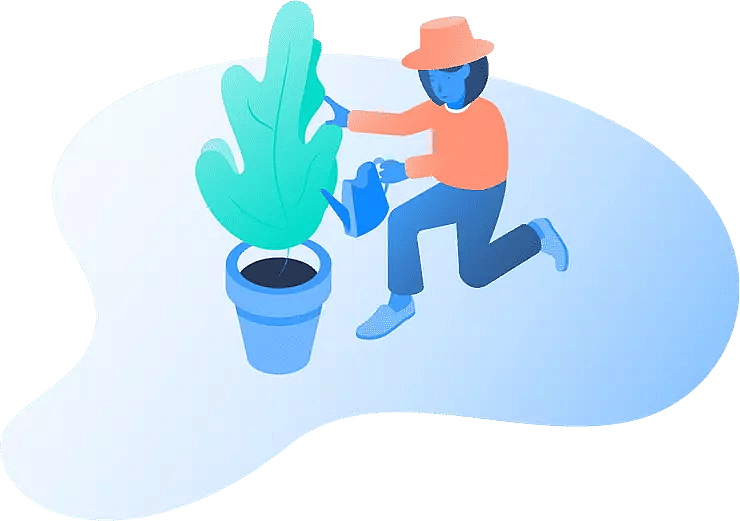Taking care of yourself
[trp_language language=”en_US”]
We want to show you that taking care of yourself can be simple.
Take a few seconds to think about a houseplant.
Whatever you’re imagining, be it cactus, fern, or peace lily, that plant needs care and attention. Tend to it regularly, and it will flourish. Neglect it, and it will start to wilt.
Your health isn’t so different.[1][2]
Taking proper care of your body and mind will keep you healthy and improve your wellbeing. Good self-care can also help people living with long-term conditions: as many as 75% of hospital admissions for asthma and diabetes could be avoided with good self-care routines.
So what do we mean by “taking care of yourself”?
It’s about breaking unhealthy habits and doing small things every day that add up to a healthier, happier you. We want to help make taking care of yourself part of your routine, something you do without thinking.

Where to begin?
Check out our taking care of yourself articles. They’re packed with information and digestible tips to help you look after your body and mind.
Avoiding burnout
Burnout is the physical, emotional, and mental exhaustion caused by chronic, long-term stress. Get tips about how you can avoid it.
Sleeping better
Sleep is essential for a healthy life and an activity most of us love. So why do so many of us struggle to get enough of it? Get tips to make sure you’re getting the rest you need.
Managing anxiety
Anxiety is something we all experience now and again. But for some people, it regularly affects day-to-day life. Get tips for managing anxiety and preventing it in the long term.
Sunbathing and vitamin D
Vitamin D is vital for your health. But protecting yourself from the harmful effects of the sun is just as important. Get tips for getting enough vitamin D safely.
Getting active
Physical inactivity is among the top-10 leading causes of death and disability globally. But getting enough activity is easily achievable for most of us. Get tips for moving more at home, at work, and on the go.
Reducing screen time
We’re spending more and more time staring at screens. But is it doing us any good? Get tips on how you can cut back on screen time.
Reducing risk: type 2 diabetes
Type 2 diabetes is a common condition linked to glucose and it affects more people today than ever before. Get tips on how you can reduce your risk.
Working from home
Switching to a home office can present new challenges to your mental and physical health. Get tips on staying safe, healthy, and happy while you work from home.
Spotting the difference: UTIs and STIs
You must understand the difference between UTIs and STIs so that you know when it’s time to see a doctor. Get tips on how to tell them apart and what you can do to prevent them.
Blainey, D., et al. Health Trends, (1990), PMID: 10110543.
Alexander, W. D. Diabet Med, (1988), DOI: 10.1111/j.1464-5491.1988.tb01055.x.
[/trp_language]
[trp_language language=”ar”] [wp_show_posts id=”4344″] [/trp_language]
[trp_language language=”fr_FR”] [wp_show_posts id=”4348″] [/trp_language]
## The Ultimate Guide to Taking Care of Yourself: A Comprehensive Q&A
**Q: Why is it essential to prioritize self-care?**
**A:** Self-care enhances overall well-being, both physically and mentally. It reduces stress, improves sleep, boosts immunity, and increases productivity. By taking care of ourselves, we are better equipped to handle life’s challenges and maintain a healthy, fulfilling life.
**Q: What are some key aspects of self-care?**
**A:** Self-care encompasses a holistic approach, addressing various aspects of life. It includes:
* **Physical health:** Exercise, nutrition, sleep, hydration
* **Mental health:** Stress management, mindfulness, hobbies
* **Emotional health:** Self-expression, relationships, emotional regulation
* **Social health:** Social connections, support systems
* **Spiritual health:** Purpose, meaning, values
**Q: How can I incorporate self-care into my daily routine?**
**A:** Self-care can be integrated into your daily life through simple, manageable steps:
* **Exercise regularly:** Aim for 30 minutes of moderate-intensity exercise most days of the week.
* **Eat a healthy diet:** Focus on fruits, vegetables, whole grains, and lean protein.
* **Get enough sleep:** Adults need 7-9 hours of quality sleep per night.
* **Manage stress:** Practice stress-reducing techniques like meditation, yoga, or spending time in nature.
* **Spend time with loved ones:** Social connections are vital for emotional well-being.
* **Engage in hobbies:** Set aside time for activities you enjoy that bring joy and relaxation.
* **Take breaks:** Step away from work or responsibilities for short breaks throughout the day to recharge.
**Q: What are some common barriers to self-care?**
**A:** Barriers to self-care can include:
* **Time constraints:** Lack of available time due to work, family obligations, or other commitments.
* **Negative self-talk:** Self-limiting beliefs or feelings of guilt or unworthiness.
* **Financial limitations:** Limited resources to access self-care activities like therapy or gym memberships.
* **Cultural or societal norms:** Cultural expectations or social pressures that discourage prioritizing self-care.
**Q: How can I overcome barriers to self-care?**
**A:** Overcoming barriers to self-care requires:
* **Reframing your mindset:** Focus on the benefits of self-care and its importance for your overall well-being.
* **Prioritizing your time:** Schedule time for self-care activities, even if it’s just for a short period each day.
* **Seeking support:** Reach out to friends, family, or therapists for encouragement and accountability.
* **Exploring affordable options:** Research free or low-cost self-care resources, such as community classes or online support groups.
* **Challenging social norms:** Educate yourself and others about the importance of self-care and its role in maintaining healthy relationships and communities.
**Remember, self-care is not selfish; it’s essential for your physical, mental, and emotional health. By prioritizing your well-being, you invest in a fulfilling life. Embrace self-care today and enjoy the transformative benefits it brings.**








Taking care of yourself